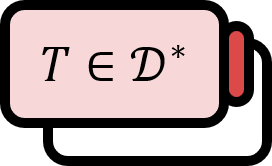Differentiation of the Product of Distributions
Theorem1
Let’s denote $T\in D^{\ast}$ as a distribution, and $f \in C^{\infty}$ as a smooth function. Then, the following equation holds.
$$ (fT)^{\prime}= f^{\prime}T+fT^{\prime} $$
Explanation
It fits perfectly with the existing product rule, so one can feel that the differentiation of a distribution and product of distributions have been plausibly defined.
Proof
By the definition of distribution differentiation and product, the following is true.
$$ \begin{align*} D( fT (\phi) ) &= D( T(f\phi) ) \\ &= T\left( (f\phi)^{\prime} \right) \\ &= T(f^{\prime}\phi+f\phi^{\prime}) \\ &= T(f^{\prime}\phi)+T(f\phi^{\prime}) \\ &=f^{\prime}T(\phi)+fT(\phi^{\prime}) \\ &= f^{\prime}T(\phi)+fT^{\prime}(\phi) \end{align*} $$
Therefore, we obtain the following.
$$ (fT)^{\prime}=f^{\prime}T+fT^{\prime} $$
■
Daniel Eceizabarrena perez, Distribution Theory and Fundamental Solutions of Differential Operators (2015), p12 ↩︎
